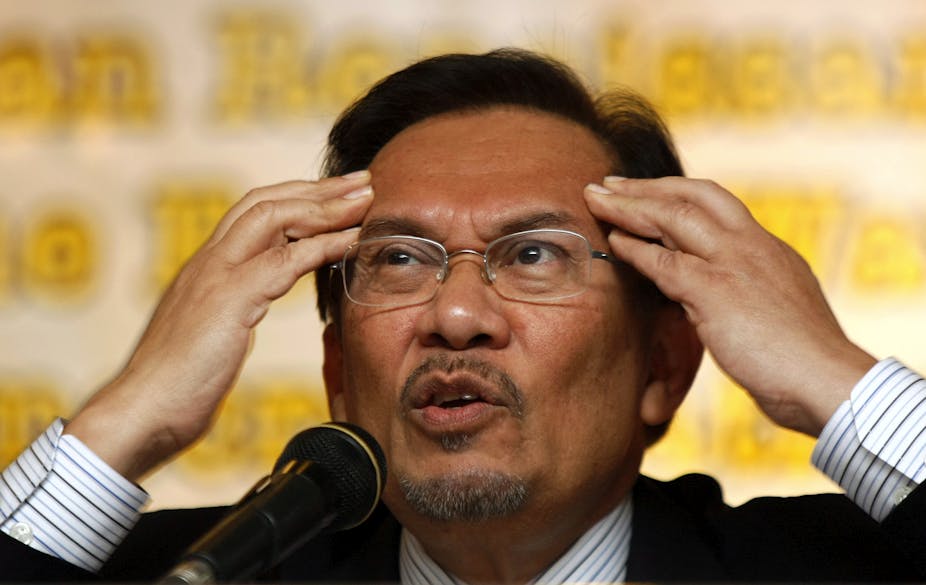My taxi driver laughed as the newsreader concluded the announcement that Anwar Ibrahim’s appeal against his conviction for sodomy had been refused, and that the leader of Malaysia’s fragmentary opposition coalition is to return to jail for five years. “Malaysia Boleh!” (“Malaysia Can!”) he chortled – invoking an early 1990s slogan familiar to all Malaysians.
Back then, “Malaysia Boleh!” summoned Malaysians to play their part in the building of the country. These days, after 57 years of continuous power in the hands of, in effect, one party, the phrase is most often accompanied with a shake of the head, a rolling of the eyes, a gloomy shrug or laughter.
These two words capture many people’s sense that the Malaysian ruling elite can get away with anything – and also that here in Malaysia, just about anything can happen.
Clinging on
Malaysia’s governing coalition, Barisan Nasional (BN) is dominated by the United Malays National Organisation (UMNO), which has ruled since independence, but it now faces unprecedented challenges to its mandate.
In the most recent general election, it lost the popular vote by some distance. But thanks to some artful constituency boundary tweaks by the electoral commission, the ruling coalition still ended up with a significant parliamentary majority.
The decision to uphold the verdict against Anwar is part of a wider pattern: the administration’s response to its eroding support is at once increasingly repressive and increasingly incoherent.
Despite the immediate denials from the Prime Minister’s Office that the prosecution was politically motivated or the judges anything but impartial, there is widespread feeling that this verdict can only confirm the reality of a badly compromised legal system.
For many observers, the Malaysian government is a wounded animal, unpredictable and defensive, uncertain and aggressive – a government confronted by a fearful combination of troubles, not least the recent precipitous drops in oil revenues, so critical to the national budget.
Anyone but UMNO
The failure of Anwar Ibrahim’s appeal could have any number of effects on the Malaysian political landscape, but Malaysia’s future hinges more on the behaviour of the government than on the strength or motivation of the political opposition or civil society.
This is the central irony of Malaysian politics. The opposition is so weak, so fragmented, so internally divided, so ideologically incoherent, that its essential message and manifesto amounts quite explicitly to the slogan “Anyone But UMNO” (ABU t-shirts are widely available).
Of course, the government has done much that has served to intensify and inflame such sentiments. It has openly manipulated the mainstream media to promote its own agenda, used legislation such as the Sedition Act to threaten and silence opposition figures, and gerrymandered electoral boundaries to its advantage.
It also deliberately nurtures conservative, even extreme, currents of Islamic thought to convince the Malay Muslim majority that their faith and culture are under threat, and that only it can protect them. It articulates explicitly racist propaganda marginalising and attacking non-Malay minorities.
And above all, it suffers from an overwhelming perception of endemic corruption. Malaysia boleh, indeed.
On track
Aside from Anwar Ibrahim, there seems to be no figure with sufficient stature or credibility to harness the anti-government sentiment to any real political gain – and it’s far from clear that even he would have been able to hold the fragile opposition coalition together.
For many people, Anwar is a deeply compromised figure, part of the problem rather than in any sense the answer. He rose spectacularly through the UMNO ranks to the position of Minister of Finance and heir-apparent in Prime Minister’s Mahathir’s administration, and his fall from grace in the late 1990s, was just as sensational, amid torrid allegations of corruption and abuse of power.

The largest party in Anwar’s opposition alliance, the Pan-Malaysian Islamic Party (PAS), is campaigning to augment Malaysia’s existing shariah laws with a much more severe form, known as hudud, a system much more akin to that which prevails in Saudi Arabia. None of the other opposition parties could countenance such a move – but PAS, which has around 1m members, is essential to any viable opposition, and it must be accommodated to assemble any real force against the government. Can a viable new politics be founded upon such shaky foundations?
Moreover, the leaders of the opposition political parties are publicly divided, their disagreements and feuds magnified in the popular press. It would be yet another irony if Anwar’s latest conviction and incarceration ended up uniting them, rather than depriving them of the leadership they so require.
There are likely to be widespread popular demonstrations against the Anwar Ibrahim verdict, and some rallying of opposition support. There will be appeals to Amnesty International, to Human Rights Watch, to the Commonwealth, to the United Nations. There will be much frowning and disapproval from statespeople and politicians around the world: the UK’s Minister for Asia, Hugo Swire, has already spoken out.
But in all likelihood, unless the Malaysian government and security forces engage in unusually brutal repressive measures and provoke some kind of popular uprising in response (extremely unlikely, given Malaysia’s history), the verdict will not do much to change the country’s political trajectory. Only with the emergence of the next generation of political agents, both within and without the existing parties, will there be significant change.
For an indication of the potential futures for Malaysia, we need perhaps to look at the contrasting fortunes of the regimes of the former Soviet Union, and of the People’s Republic of China.
In the Soviet Union, the ruling party collapsed under the weight of its appalling internal contradictions and was swept away (for better or worse). In China, incremental change transformed what appeared a sclerotic and bankrupt regime and a process best described as a Long Revolution continues to this day (again, for better or worse). If the Malaysian opposition stands little chance of changing things any time soon, it will be interesting to see whether Barisan Nasional can.

